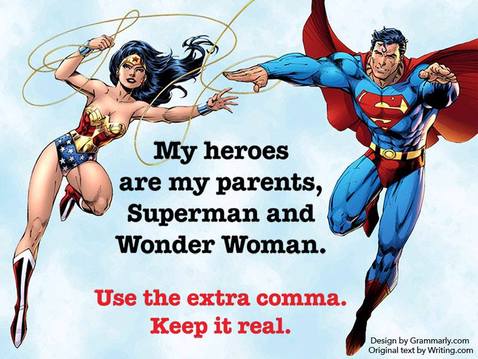
The Oxford comma, also known as the Serial comma, is the comma that is placed before a coordinating conjunction (and, or, nor) at the end of a list.
I know that there has been much debate over the use of the Oxford comma. Some will agree with my recommended use of it, and others will not.
Opponents argue the overuse and redundancy of its use, but I suggest that my arguments out way these reasons.
Let me begin:
First, the Oxford comma matches the natural speech pattern of pausing before the last item in a series.
Second, let's look at the picture/text taken from the Facebook page of Grammarly.com. Without the comma before the word 'and', it reads as though my parents are Superman and Wonder Woman. While the idea is funny, this is not the case. I'm sure the picture/text means to suggest that my heroes are my parents, Superman, and Wonder Woman.
So I ask, why risk the ambiguity? Using the Oxford comma clarifies the meaning of the sentence and resolves any possible confusion.
In the book Eat, Shoots & Leaves, the author Lynne Truss describes how grammar rules are beginning to get too relaxed in today's society.
The joke of the book's title is that a panda walks into a café. He orders a sandwich, eats it, then draws a gun and proceeds to fire it at the other patrons.
Why?" asks the confused, surviving waiter amidst the carnage, as the panda makes towards the exit. The panda produces a badly punctuated wildlife manual and tosses it over his shoulder.
"Well, I'm a panda," he says. "Look it up."
The waiter turns to the relevant entry in the manual and, sure enough, finds an explanation. "Panda. Large black-and-white bear-like mammal, native to China. Eats, shoots and leaves."
My argument ends with this final statement: The Oxford comma saves lives.
 RSS Feed
RSS Feed